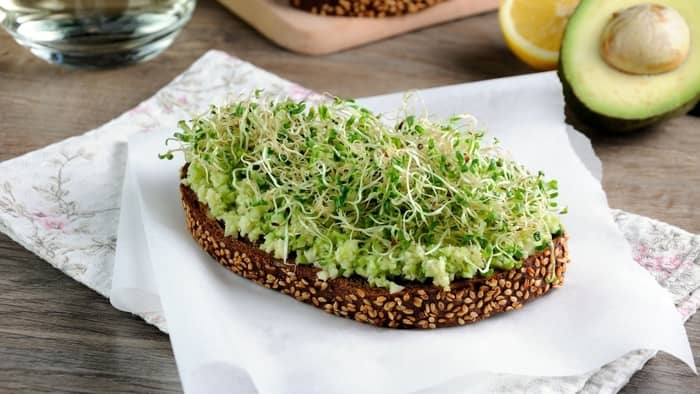Last Updated on July 26, 2021
Today we’re going to be answering the question: are alfalfa sprouts gluten-free? But first, we will take a look at what alfalfa is and does alfalfa have gluten in it at all? You may or may not have heard of alfalfa sprouts, they aren’t particularly popular but they can be a great addition to the gluten-free diet.
What Is Alfalfa?
Alfalfa is a plant from the legume family. Others may say it’s part of the herb family. It’s leaves, sprouts, and seeds are all used to make a variety of products. For example, crop for livestock, medicine, and food for us. It’s grown all around the world, which makes it relatively easily accessible.
The seeds can be taken as a daily supplement, as alfalfa offers a range of benefits. Or the seeds can be grown and you’re left with alfalfa sprouts.
Is Alfalfa Gluten-Free?
Good news! Alfalfa is naturally 100% gluten-free. Even better news, it’s full of nutrients and is extremely low in calories. One cup of alfalfa sprouts contains only 8 calories! You may even find alfalfa seeds in your gluten-free bread.
Gluten is a protein that you will find in a selection of grains, such as wheat, rye, and barley. The alfalfa plant itself is not a cereal grain, so isn’t something we must avoid while following a gluten-free diet.
Whilst we may have answered the question of does alfalfa contain gluten, we can now take a look at the sprouts themselves and the benefits and potential dangers of adding them to our diet.

Read more about: Gluten Free Bread Brands At Walmart
Benefits Of Alfalfa Sprouts
There’s a host of reasons as to why alfalfa sprouts are a great addition to your daily life. Here are just a few:
- They’re extremely versatile and easy to grow. They’re perfect for sandwiches, soups, and salads, meaning you can incorporate them into almost any meal
- They contain large amounts of Vitamin K, Vitamin C, folate, manganese, copper, and folate. In fact, a serving of sprouts contains a whopping 38% of the amount of Vitamin K your body needs daily
- Can help anemia prevention due to the levels of iron and folate
- It’s been proven to help menopausal symptoms
- Great for heartburn and acid reflux
- Can help to lower cholesterol
- It can even help strengthen hair and nails!
There are lots of other benefits that you can associate with the alfalfa plant. However, it is definitely worth taking a look at the potential dangers of alfalfa sprouts. One of them is particularly important to those with celiac disease.
Potential Dangers Of Alfalfa Sprouts
If your diagnosis is celiac disease, rather than just a gluten sensitivity, you must be very careful when consuming alfalfa sprouts. In fact, you may want to avoid them altogether.
Celiac is an autoimmune disease and it has been proven that alfalfa sprouts or supplements can cause an inflammation in consumers with certain autoimmune disorders. It can reactivate lupus, or even cause lupus-like symptoms. If you’re wanting to consume alfalfa sprouts on a celiac disease, it’s always best to check with a healthcare professional to check that it’s suitable for you.
Another concern is that the conditions needed for alfalfa to grow are moist. This is the perfect environment for bacteria to multiply. And unfortunately, the ideal place for pathogens such as E.coli and Salmonella. Even without celiac disease, eating a product contaminated with either of those pathogens can make you extremely ill.
Eating contaminated food with celiac disease can be very dangerous. Our immune systems are already compromised, so consuming foods containing these pathogens would be very serious if we became infected. If you’re worrying about the consumption of alfalfa, be sure to check with your doctor.
The FDA actually now advises these groups of people to avoid eating raw alfalfa sprouts:
- Over 65
- Pregnant women
- Children under 5
- People with a weak immune system (particularly those with organ transplants and other such patients)
A more lighthearted side effect (but just as unpleasant!) is that it can cause flatulence, Diarrhoea, cramps and other gastro issues. This is only if eaten in large volumes. This is due to alfalfa containing large amounts of fiber.
Ways To Incorporate Alfalfa Sprouts Into Your Diet
If like me, you’re gluten-intolerant or have a sensitivity to gluten, alfalfa sprouts are great for your diet. And there’s a selection of ways to transition them in easily. For example:
- Add to your sandwich
- Use as part of a sandwich filling
- Replace them from beansprouts in stir-fries or spring rolls
- Put them on top of soup
- Blitz them into your smoothies
- Use as a pizza topping
- Eat a handful as a snack (they’re small, crunchy, and grassy tasting)
Alfalfa Sprouts Recipe
Riverford Organic Farmers have a tasty-looking recipe, which is super easy. Their Beetroot, Carrot and Alfalfa Salad is not only gluten free, but dairy-free too! It’s healthy, nutritious, and can easily be adapted. Adding chicken or beef to this salad would make it even more filling and delicious! Because it’s so simple to adapt, this recipe would be perfect for any time of the year.
There’s a wide selection of other recipes which are easily accessible online.
Growing At Home
You can easily grow alfalfa sprouts at home. All you need are alfalfa seeds, a mason jar, and water. It really is that simple! Pass the Plants has a step-by-step guide on how to grow them at home. It’s much safer to grow them at home yourself than to buy in a store. And they’ll taste much fresher! You can purchase seeds at your local grocery or health store.
Adding Alfalfa Sprouts
To conclude, alfalfa sprouts can be a welcome addition to your diet. And remember if you’re celiac and are wanting to eat alfalfa sprouts, please always check with a healthcare professional first.
Do you have any recipes containing alfalfa sprouts? Or inventive ways to introduce them to your diet? I would love to know in the comments below.

Hi, my name’s Zoë. I’m 28 years old and live in London, UK. I work full time as a freelance writer and critic for West End theatre. Writing has been a passion of mine for as long as I can remember. I spend most of my free time at the theatre, or at conventions. I’m married to the love of my life, and live in a small apartment with my fur baby, Lillie. I run two of my own blogs: No Safer Place and Stage to Page: both of which have won awards. I also have a YouTube channel where I talk about all things stagey.
